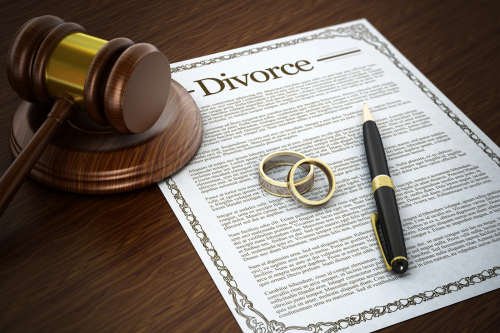3 Reasons Why You Should Never Hide Assets upon a Divorce
 Although it doesn’t happen too often, there have been cases where, during the divorce process, one party tries to conceal assets from their spouse. While the temptation to protect your financial interests during a divorce may be strong, as matrimonial solicitors, the team at Vines Legal cannot emphasise enough how detrimental this approach can be in the long run. Hiding assets is not only unethical but also illegal, and it can lead to severe consequences. In this article, we’ll outline three compelling reasons why you should never consider hiding assets during a divorce.
Although it doesn’t happen too often, there have been cases where, during the divorce process, one party tries to conceal assets from their spouse. While the temptation to protect your financial interests during a divorce may be strong, as matrimonial solicitors, the team at Vines Legal cannot emphasise enough how detrimental this approach can be in the long run. Hiding assets is not only unethical but also illegal, and it can lead to severe consequences. In this article, we’ll outline three compelling reasons why you should never consider hiding assets during a divorce.
1. Hiding Assets is Against the Law and Could Result in Imprisonment
Family courts have a duty to ensure a just distribution of assets in a divorce settlement, and they rely heavily on the financial information provided by both parties. Hiding assets during divorce will almost certainly complicate and delay reaching a financial settlement. If discovered, the court could choose to impose punishments, from being ordered to pay court fees and that of the wronged party to being held in contempt of court, fines, or even imprisonment.
As well as being ordered to settle all legal costs, hiding assets can result in you receiving a worse financial settlement. If the assets you have hidden by deception are discovered down the line, the court has, in certain circumstances, the power to reopen the original settlement and make changes to the original Financial Order.
2. Damage to Credibility and Reputation
Engaging in deceptive practices like hiding assets can severely damage your credibility and reputation during divorce proceedings. Family court judges and legal professionals expect parties to approach the process with both honesty and integrity. If you are caught trying to hide assets, not only will you lose the trust of the court, but it will also negatively impact your chances of achieving a favourable settlement.
Your credibility is, of course, critical in any legal proceeding, and dishonesty can lead to significant consequences beyond the divorce case. It may affect your standing in the eyes of your children, family, friends, and colleagues. The stigma associated with dishonesty during a divorce can be difficult to shake off and can even lead to long-term personal and professional repercussions.
3. Unfair Financial Settlement
Hiding assets may initially seem like a strategic move to protect your wealth, but it often leads to unfair financial settlements in the long run. When assets are concealed, the court is unable to make an accurate assessment of the true value of the marital estate. Consequently, the disadvantaged spouse may receive a smaller share of the assets or be burdened with additional financial responsibilities that would have otherwise been distributed more evenly.
Family courts frown upon deceptive tactics during divorce proceedings and may take a harsh stance against the party attempting to hide assets. This can result in an even more unfavourable settlement, as the court may impose punitive measures to deter others from engaging in similar conduct.
If you are considering a divorce, Vines Legal would always recommend that you to approach the process with integrity and seek professional legal advice. We can help you navigate the complexities of divorce law, protect your rights, and achieve a fair resolution. Remember, honesty is not just the best policy; it is the only policy when it comes to divorce proceedings. For further help and advice, please contact us on 01246 555610 for a FREE initial consultation.
By Vines Legal on 17 Aug 2023
How Long Does the Divorce Process Take?
 As matrimonial lawyers, one of the most common questions we’re asked here at Vines Legal by clients considering divorce is, "How long will it take?" The truth is that the duration of the divorce process can vary significantly depending on various factors. While everyone wishes to complete the process in a timely fashion, it's crucial to recognise that each case is unique and may require a different approach. In this article, we’ll provide an overview of the divorce process and highlight key factors that can influence its duration.
As matrimonial lawyers, one of the most common questions we’re asked here at Vines Legal by clients considering divorce is, "How long will it take?" The truth is that the duration of the divorce process can vary significantly depending on various factors. While everyone wishes to complete the process in a timely fashion, it's crucial to recognise that each case is unique and may require a different approach. In this article, we’ll provide an overview of the divorce process and highlight key factors that can influence its duration.
In short, the divorce process usually takes at least 6 months. There may be complications, however, that can considerably extend the process, including complex financial issues, child arrangements, assets, property, and pensions. That’s why we’d always recommend that you seek legal representation right from the beginning. An error at any stage can be costly, sometimes difficult to put right, and may leave you in a worse position than you would have been if you had used a solicitor from the start.
No Fault Divorces
The good news is that the recent change in divorce law has made the process a little simpler. The new no-fault divorce option ends the need for separating couples to apportion blame for the breakdown of their marriage, allowing them to apply for divorce by simply stating their marriage has broken down irretrievably.
Before the law changed, one spouse would have to make accusations about the other’s conduct, such as ‘unreasonable behaviour’ or adultery, or alternatively face years of separation before the courts would allow a divorce to be granted, regardless of whether they had mutually decided to separate. This new law essentially negates the need to place blame, so a spouse, or a couple jointly, can now apply for divorce by simply stating their marriage has broken down irretrievably.
Making Arrangements
A large factor that significantly impacts the duration of a divorce is whether the separating couple can agree on all the relevant issues, such as property division, child custody, and financial arrangements. This type of divorce tends to be quicker and less expensive because there is no need for lengthy court battles. On the other hand, if financial and child arrangements cannot be resolved between the two parties, you may need to go to court, therefore leading to more complex negotiations and potentially a trial.
Financial Complexity
The complexity of the financial arrangements involved in the divorce can significantly impact the timeline. High-value assets, shared business interests, and multiple properties may require thorough investigations, valuations, and negotiations. Reaching a fair and equitable financial settlement can be time-consuming, but it is essential to secure your financial future post-divorce. Collaborative approaches, such as mediation and negotiation, can expedite the process by fostering constructive dialogue between both parties.
Child Arrangements
If the couple has children, the divorce process can be more intricate due to child arrangements and support matters. The courts prioritise the well-being of the children and reaching a suitable custody arrangement can take time. Additionally, if one party contests living or contact arrangements, it may result in a more extended court battle. Mediation and alternative dispute resolution methods are often encouraged to facilitate amicable agreements in child-related matters.
Legal Representation
Engaging experienced legal representation can streamline the divorce process. A skilled matrimonial lawyer can guide you through the complexities of the law, ensure all necessary documents are prepared accurately, and represent your interests in negotiations and court hearings. Having an expert on your side can speed up the process and protect your rights during this emotionally challenging time. Remember, every divorce case is unique, and the timeline can be challenging to predict precisely, but with the right approach, you can navigate this challenging process with greater confidence and peace of mind.
Here at Vines Legal, we’re experts in matrimonial and family law and have many years’ experience navigating the divorce process. For immediate, friendly, and professional advice, call us on 01246 555610 to arrange a free initial, no obligation consultation.
By Vines Legal on 3 Aug 2023
I'm Moving in with my Partner. Do I Need a Cohabitation Agreement?
 Moving in with a partner is an exciting milestone in any relationship and a time typically filled with anticipation and joy as you start a new chapter together. However, amidst all the excitement, it's important to consider the legal aspects of cohabitation. It has become increasingly common to live with a partner without being married, therefore many couples are choosing to protect themselves by entering into a Cohabitation Agreement. In this article, we will explore why you might need a Cohabitation Agreement and what it should cover to ensure your rights and assets are safeguarded.
Moving in with a partner is an exciting milestone in any relationship and a time typically filled with anticipation and joy as you start a new chapter together. However, amidst all the excitement, it's important to consider the legal aspects of cohabitation. It has become increasingly common to live with a partner without being married, therefore many couples are choosing to protect themselves by entering into a Cohabitation Agreement. In this article, we will explore why you might need a Cohabitation Agreement and what it should cover to ensure your rights and assets are safeguarded.
What is a Cohabitation Agreement?
Firstly, it's essential to understand what a Cohabitation Agreement is. A Cohabitation Agreement, also known as a living together agreement, is a legally binding document that sets out the rights and obligations of each partner in a cohabiting relationship. This contract can regulate the terms of your relationship and set out what will happen to your assets, finances, and family if you and your partner should separate. The agreement can also cover matters such as ownership of property, how household bills are paid, and what will happen to shared money and assets if the relationship breaks down. While it may not be the most romantic aspect of moving in together, it can provide much needed clarity and protection for both parties should the relationship end.
Why Should I Consider a Cohabitation Agreement?
A Cohabitation Agreement can offer crucial protection with regard to shared money and assets. Without a legal agreement, the law does not provide the same protections for cohabiting couples as it does for married couples or those in civil partnerships. In the unfortunate event of a relationship breakdown, a Cohabitation Agreement can specify how shared money, savings, investments, and assets will be divided. This can include anything from joint bank accounts and vehicles to personal belongings acquired during the relationship.
Although the Government is under increasing pressure from The House of Commons Women and Equalities Committee to improve legal protections for unmarried couples by introducing a cohabitation scheme, draft legislation isn’t expected to be scrutinised in Parliamentary Session until 2024. As the law stands at the moment, there’s no legal definition of a cohabitee and therefore cohabiting couples have no legal protection.
What Can a Cohabitation Agreement Cover?
One of the key reasons why you might need a Cohabitation Agreement is to address the issue of property ownership. In the absence of a Cohabitation Agreement, the laws surrounding property ownership can be complex and uncertain. If one partner owns the property, the other partner may have no legal rights to it, regardless of how long they have lived together or how much they have contributed financially. A Cohabitation Agreement allows you to specify how the property ownership will be shared or what will happen to it in the event of a breakup.
Another important consideration is how household bills and expenses will be met. A Cohabitation Agreement can outline the financial arrangements between you and your partner, ensuring transparency and fairness. For example, you can agree on how the mortgage or rent will be paid, who will be responsible for utility bills, and how other living expenses will be divided. This helps avoid conflicts and misunderstandings in the future.
Moreover, a Cohabitation Agreement can address other important matters, such as child custody and financial support, if you have children together. While it's always best to consult with a family lawyer to ensure your Cohabitation Agreement is comprehensive and legally valid, having an agreement in place can provide peace of mind and avoid potential conflicts and disputes in the future.
It's also worth noting that a Cohabitation Agreement can be particularly valuable if you own assets of significant value, have children from previous relationships, or if there is a substantial difference in financial contributions between partners. By proactively addressing these issues, you can protect yourself and your partner's interests and ensure a fair outcome for both parties should the relationship end.
Get Legal Protection
If you are cohabiting, or thinking of cohabiting, and do not have such an agreement in place, it may be time to seek advice on how to protect yourself in the event of a separation. A Cohabitation Agreement will offer you the legal protection you would need should the worst happen, and can save an awful lot of time, money, and stress, in the long term. As a Cohabitation Agreement is essentially a legal document, it is advisable to have it drawn up by a solicitor.
As experts in Cohabitation Agreements, Vines Legal can provide expert advice and expertise on the matter. For a free initial consultation with our specialist family lawyers, please don’t hesitate to contact us on 01246 555610.
By Vines Legal on 11 Jul 2023
How do you Split a Pension Following a Divorce?
 Divorce can be a complex and emotionally challenging process, and one aspect that requires careful consideration is the division of assets. Understandably, both parties will be keen to ensure that their futures are financially secure when they go on to lead their separate lives. One of the most important financial considerations in this instance is your pension, which should be included in your settlement. Despite this, it’s commonly overlooked. Pensions can often be a person’s single biggest asset, so protecting it in the event of a divorce is a must.
Divorce can be a complex and emotionally challenging process, and one aspect that requires careful consideration is the division of assets. Understandably, both parties will be keen to ensure that their futures are financially secure when they go on to lead their separate lives. One of the most important financial considerations in this instance is your pension, which should be included in your settlement. Despite this, it’s commonly overlooked. Pensions can often be a person’s single biggest asset, so protecting it in the event of a divorce is a must.
Establishing a Pension Valuation
In order to find out exactly how much each party will each receive from a split pension, a valuation is necessary. Valuing a pension is a complex process, which is why we always recommend support in this area. Investing in an independent pension sharing report has its costs of course, however not only is it helpful for managing expectations, it’s also a necessary document for lawyers when considering complex pension schemes.
Pension Rights and Entitlements
Before delving into the specifics of pension division, it is crucial to understand the different types of pension rights and entitlements. In the UK, there are two main types of pensions: state pensions and private pensions. The state pension is provided by the government, while private pensions are typically workplace or personal pensions. When determining how to divide a pension, there are several factors to consider.
Length of Marriage
The duration of the marriage often influences the division of pension rights. Typically, the longer the marriage, the more likely it is that pensions will be divided equally.
Contributions
The contributions made by both spouses to their respective pensions during the marriage are considered. Contributions may be monetary or non-monetary, such as caring for children or supporting the household.
Financial Positions and Needs
The financial needs and positions of both parties are assessed to ensure a fair division of assets, including pensions. Factors such as age, health, earning capacity, and child custody responsibilities may be taken into account.
Court Discretion
The court has the discretion to consider all relevant circumstances, including future financial needs, when they make a decision on pension division. This allows for flexibility in finding an equitable solution.
What are the Options for Pension Division?
There are three main options when it comes to dealing with pensions in a divorce: pension offsetting, pension sharing orders and pension attachment orders. It’s worth noting that seeking legal advice from a matrimonial solicitor before deciding upon an option is a must.
Pension Sharing
This option involves dividing the pension funds between both spouses, usually by creating separate pension funds for each individual. It provides a clean break and allows each party to control their own pension pot independently.
Pension Offsetting
With this approach, the pension value is offset against other matrimonial assets. For example, one spouse may keep the pension while the other receives a larger share of the property or other investments.
Pension Attachment
This method involves earmarking a portion of the pension benefits for the non-member spouse. The non-member spouse receives a percentage of the pension income or a lump sum when the pension is accessed by the member spouse.
There are a number of ways in which a financial settlement can be achieved. You can either reach an amicable agreement between yourselves, engage in a full and frank voluntary disclosure through solicitors, or you can apply to the Court for their assistance in achieving a resolution. The aim, once a settlement has been achieved, is to have this recorded within a Consent Order. This is then legally binding on you and your partner.
Advice from a Family Law Solicitor
Pension division can be a complex process, requiring careful consideration and expert advice. We would always recommend that you consult with a specialist family law solicitor so that they can provide guidance based on your specific circumstances and ensure you understand your rights and options, such as Vines Legal. If you are in the process of a divorce, we can help. For a free initial consultation with our specialist family lawyers, please contact us on 01246 555610.
By Vines Legal on 27 Jun 2023
How to Help Someone Going Through a Divorce
 Going through a divorce or separation can be an incredibly challenging and emotionally draining experience, even when you have a relatively cooperative and confrontation-free relationship with your ex-spouse. That’s why it’s really important for friends and family to step in and provide support to their loved ones. So, how can you help someone going through a divorce?
Going through a divorce or separation can be an incredibly challenging and emotionally draining experience, even when you have a relatively cooperative and confrontation-free relationship with your ex-spouse. That’s why it’s really important for friends and family to step in and provide support to their loved ones. So, how can you help someone going through a divorce?
Listen
One of the most important things you can do for someone experiencing a divorce is to be there to listen. Simply being present and offering a listening ear can provide immense comfort during this turbulent time. Let the person you’re supporting express their emotions and concerns without judgment and allow them to vent their frustrations and fears. Providing a safe space for them to share their thoughts can be a huge help. Reassure them that they don’t need to consistently put on a brave face – their life has changed immeasurably, so try to make them aware that it’s perfectly natural to go through a process of grieving for the relationship, and the life, that they have left behind.
Suggest Professional Support
While friends and family can provide significant emotional support, it's important to encourage your loved one to seek professional help as well if needed. Suggest that they consider therapy or counselling to help them process their emotions and cope with the challenges they're facing. A trained therapist can offer valuable guidance and tools to navigate this difficult period.
Provide a Distraction
Encouraging your loved one to engage in activities they enjoy can be a helpful way to distract them from the stress of their divorce. Suggest outings, hobbies, or other engaging activities that can provide a sense of normalcy and enjoyment. Participating in such activities can offer much-needed relief and help them regain a sense of joy during a challenging time.
Practical Help
Divorce brings about numerous logistical challenges so helping your loved one navigate these practical aspects can be incredibly valuable. Offer help with childcare, running errands, or handling household chores. This support can provide them with much-needed relief and allow them to focus on the emotional healing process.
Encourage Legal Advice
Divorce proceedings in the United Kingdom can be complex, therefore it's essential to seek legal advice and consult with a qualified family law solicitor who specialises in divorce cases. A solicitor can guide your loved one through the legal requirements, explain their rights and responsibilities, and help them make informed decisions regarding their divorce settlement, child custody arrangements, and financial matters. It's crucial to stress the importance of seeking legal advice early in the process to ensure that their rights and interests are protected.
Going through a divorce is undoubtedly a difficult experience, but with the support of loved ones, it can be made more manageable. By providing a listening ear, offering practical support, and helping them find some joy in life following their separation, you can help your loved one navigate this challenging chapter in their life. Your support can make a significant difference in their journey toward healing and rebuilding their life.
Here at Vines Legal, we’re experts in helping our clients through the process of separation and divorce. If you are considering a separation, or going through a divorce, please do contact us on 01246 555610 for a free initial consultation.
By Vines Legal on 11 Jun 2023
What do you Need to Know about the Transparency Pilot in Family Courts?
 As matrimonial solicitors, the newly launched Transparency Pilot is an interesting programme that could have a major impact upon the family courts if rolled out across the UK. Aimed at enhancing public confidence in family court through increased transparency, the pilot will provide the media and the public with greater access to information about court proceedings.
As matrimonial solicitors, the newly launched Transparency Pilot is an interesting programme that could have a major impact upon the family courts if rolled out across the UK. Aimed at enhancing public confidence in family court through increased transparency, the pilot will provide the media and the public with greater access to information about court proceedings.
What is the Transparency Pilot?
Introduced in January 2023 and currently being trialled in 3 designated courts across the country, the Transparency Pilot is designed to test the impact of greater transparency in family court proceedings, with a view to potentially extending the changes across the whole of the system. Under the pilot, certain court hearings will be open to the public and the media, including cases involving domestic abuse, the care and welfare of children, and other serious issues.
The pilot essentially allows reporters including accredited journalists and legal bloggers to both attend and report on court hearings relating to arrangements for children, so long as they maintain the anonymity of the parties and children. Naturally this will allow for the publication of judgments in these cases, which were previously only available to parties involved in the case. Reporters’ access is currently being tested to ensure that it can be done safely and with minimal disruption to those involved in the cases and the courts.
Will Cases be Anonymous?
Yes, the cases reported on will still be anonymised. No one is allowed to name or take photos of the family members, although in some cases it may be possible for you to recognise your case based on specific details. Crucially though, the aim is to make sure that others cannot identify your case by any of the facts reported.
It's been frequently debated over the years as to whether there should be more transparency in the family courts but there are major factors in play here that have contributed to the slow pace of change in this area of the law. Although there may be a need to boost public trust in the family court, there’s also the valid argument of the need to maintain confidentiality and privacy for those who use the family court to resolve family disputes.
Maintaining Privacy
Under the rules, a judge will set out what can and cannot be reported by making a “transparency order”. This would, therefore, allow journalists, reporters, and legal bloggers to enter family court hearings, watch the hearing unfold, and then report what happens, as well as allow them to look at certain documents from the case. It would also allow those involved in the cases to talk to journalists, reporters, and legal bloggers about their own case.
However, it’s important to stress that members of the public or person with an interest in your case would not be allowed to come to hearings under the guise of being a journalist as they would either need to show a UK Press Card, or prove that they are a lawyer who is not involved in the case but is authorised to attend hearings.
The pilot will operate for one year in 3 courts; Cardiff, Carlisle, and Leeds, and covers both public law and private law children matters, that is, those involving the state, such as care proceedings, as well as disputes between parents about issues such as where a child should live and contact arrangements. However, there is a list of details regarding cases that cannot generally be reported, including the details of any alleged sexual abuse, and it will still be a criminal offence to publish information that could identify the children involved. In addition, a judge can order that there should be no reporting in a particular case.
Here at Vines Legal, we have years of experience in helping our clients through the process of separation and divorce. If you are considering a separation, or going through a divorce, and want to ensure that arrangements regarding finances, property, and your children are concluded in the most efficient way, please contact us on 01246 555610 for a free initial consultation. We’d be happy to explain all of the options available to you in a friendly, professional manner.
By Vines Legal on 30 May 2023
3 Steps to Take to Secure a Financial Settlement on Divorce
 As matrimonial solicitors, we know that there are multiple ways to achieve a financial settlement in the event of a divorce or separation. Understandably the process of going through a divorce can be an extremely stressful period in people’s lives. One of the toughest and most complex parts to navigate is a financial settlement, which can often be difficult to reach.
As matrimonial solicitors, we know that there are multiple ways to achieve a financial settlement in the event of a divorce or separation. Understandably the process of going through a divorce can be an extremely stressful period in people’s lives. One of the toughest and most complex parts to navigate is a financial settlement, which can often be difficult to reach.
With regard to financial settlements, there are several options. Some separating couples may be able to reach an amicable agreement between themselves, may wish to participate in honest voluntary disclosure through solicitors, or choose to apply to the Court in order to reach a resolution. Here at Vines Legal, we are experts in guiding people through the process of securing financial settlements upon divorce. With that in mind, here are the first 3 steps to take if you’re embarking on the process.
Assess your Financial Situation
The very first step to take in the event of a separation is to thoroughly assess your financial situation, both as a couple and as individuals. Providing things are amicable and communication is honest and open, it can be useful to attempt to build up an accurate assessment of your current state of affairs including a monetary figure outlining what you have, how much you owe, and how this could be split.
Instruct a Solicitor
If you’re able to agree on how your assets will be divided, it’s important to make sure the agreement is legally binding. The best way to ensure this is by allowing a solicitor to draft a financial consent order. It can then be sent to the Court to be checked by a Judge to ensure that it is fair and reasonable before it is endorsed by them to make it a legally binding Order.
But what happens if you can’t agree? If an agreement cannot be reached in this manner, then it will be necessary to apply to Court to achieve a resolution. As matrimonial solicitors, we always advise that a solicitor is instructed to ensure the best financial settlement for you. Unfortunately, this can be a complex process and will include a variety of considerations including the financial needs of the parties and the needs of any children, the current earnings of both parties, and the contributions that both parties have made to the marriage, both financial and otherwise. With so much to consider, it’s always advised that a solicitor is instructed to keep the process as fast moving, straightforward, and stress free as possible.
Cutting Financial Ties
Many people assume that after a separation or divorce, financial ties between the two parties are immediately broken. However, this isn’t necessarily the case, and financial association can continue unless you request a notice of disassociation from the credit reference agencies. Being financially associated with someone will show up on your credit report, including joint accounts, mortgages, or any other credit such as a loan or joint credit card accounts. To break any link between your credit and your former partner’s, it is advised that you apply for a notice of disassociation after the matrimonial assets have been split and transferred into sole names.
To ensure you achieve the best financial settlement for you in the event of a separation or divorce, contact Vines Legal on 01246 555610 for a FREE initial consultation.
By Vines Legal on 17 May 2023
5 Legal Tips all Unmarried Couples Should Know
 Recent statistics show that there has been a steady increase in the number of couples, particularly younger people, who choose not to marry in England and Wales. Figures from the 2021 census have revealed that there are now 5.8 million people aged 25 to 35 who are unmarried compared to 1991, when 2.7 million 25- to 35-year-olds were unmarried. As the proportion of adults who have never been married or entered into a civil partnership has increased for all ages under 70 years since the 2011 census, it’s never been more important to protect yourself if you’re part of an unmarried couple. As matrimonial lawyers, here are our top 5 legal tips that unmarried couples should know.
Recent statistics show that there has been a steady increase in the number of couples, particularly younger people, who choose not to marry in England and Wales. Figures from the 2021 census have revealed that there are now 5.8 million people aged 25 to 35 who are unmarried compared to 1991, when 2.7 million 25- to 35-year-olds were unmarried. As the proportion of adults who have never been married or entered into a civil partnership has increased for all ages under 70 years since the 2011 census, it’s never been more important to protect yourself if you’re part of an unmarried couple. As matrimonial lawyers, here are our top 5 legal tips that unmarried couples should know.
1. No Legal Definition of a Cohabitee
Despite proposed future changes for reforming cohabitation law, at present there’s no actual legal definition of a cohabitee. This means that the persons involved are still considered individuals in the eyes of the law, despite sharing a home. This can inevitably cause problems for cohabitees who decide to separate, and then find out that they don’t have the same rights as couples who are married or who are in civil partnerships.
2. The Myth of Common Law Marriage
Despite the common misconception of the common law marriage, people who have cohabited are not covered by the same legislation as those who have married or entered into a civil partnership, and consequently they do not have automatic rights to claim against the other if the relationship breaks down. For example, they’re exempt from maintenance rights, rights to their partner’s pension, and automatic inheritance (unless there is a will in place).
3. Property Matters
For unmarried couples who live together and are separating, you do not have an automatic claim on property owned in one person’s name. If you co-own your property, you will be either ‘tenants in common’ or ‘joint tenants’, which will be recorded at HM Land Registry. If you are ‘tenants in common’ your beneficial interest will have been recorded when you purchased the property.
4. Shared Children
Although unmarried couples who separate don’t have the right to make a financial claim for support for themselves or against their ex-partner, they may have a right to make claims of an income or capital nature in relation to any children. This may be either via Child Maintenance or an application under schedule 1 of the Children Act.
5. Protection with a Cohabitation Agreement
Cohabitation Agreements can be drawn up to cover the financial aspects of a couple’s relationship whilst they are cohabiting. This legal document can be useful for a couple who are choosing to buy a property and intend to formalise who will pay certain bills or debts, or when drawing up what shares in the property the individuals will hold. Cohabitation Agreements are also a sensible idea if the couple chooses to have children. And, in the event of a separation, Cohabitation Agreements are a good way to protect both parties financially.
As experts in Cohabitation Agreements, Vines Legal can provide advice and support for unmarried couples. For a free initial consultation with our specialist family lawyers, please don’t hesitate to contact us on 01246 555610.
By Vines Legal on 9 May 2023
How and When to Make a TOLATA Claim
 When unmarried couples decide to move in together, many choose to buy a home, or even move into their partner’s home. But what happens if that relationship breaks down and they decide to separate? As matrimonial solicitors, Vines Legal have worked with many couples who have experienced disputes that have come up in relation to the ownership of the property, the division of the equity of the property, or who gets to live in the property after the separation. Of course, it often comes as a shock for unmarried couples who decide to part ways when they realise that they are not protected by the same laws that apply to married couples. If you’re in this situation, it may be necessary to make an application under TOLATA. So, how, and when should you make a TOLATA claim?
When unmarried couples decide to move in together, many choose to buy a home, or even move into their partner’s home. But what happens if that relationship breaks down and they decide to separate? As matrimonial solicitors, Vines Legal have worked with many couples who have experienced disputes that have come up in relation to the ownership of the property, the division of the equity of the property, or who gets to live in the property after the separation. Of course, it often comes as a shock for unmarried couples who decide to part ways when they realise that they are not protected by the same laws that apply to married couples. If you’re in this situation, it may be necessary to make an application under TOLATA. So, how, and when should you make a TOLATA claim?
What is TOLATA?
The Trusts of Land and Appointment of Trustees Act 1996 (TOLATA) is a piece of legislation in the UK that governs the rights of individuals who own property or land together. In essence, it provides a mechanism for resolving disputes about the ownership of land, particularly in the case of unmarried couples who are separating, or for two or more people who own land or property together.
The TOLATA legislation gives the Court the ability to assist in resolving unmarried couple’s property disputes. Under this law, some of the orders the Court can include determining what share of a property each party owns, forcing the sale of land or property, and enabling one party to regain access to a property when the other party refuses to leave.
How do you Make a TOLATA Claim?
In the event the property is owned in the sole name of one of the parties, the other must first establish an interest or entitlement in that property before any question as to the distribution of equity arises. Legal interest means that you have a right to occupy, own, or receive income from the property. If you are not sure whether you have a legal interest, you should seek legal advice as soon as possible. A solicitor can advise you on your legal position and establish whether you have a valid claim.
This area of law can be complex. The court must consider what was expressly agreed or what the parties' intentions were at the time of purchase.
When Should I Make a TOLATA Claim?
Making a TOLATA claim can be a complex and challenging process, but it is an important mechanism for resolving disputes about the ownership of property or land. If you are considering making a TOLATA claim, it is important to seek legal advice as early as possible in the process to understand your legal position and to ensure that your interests are protected.
For more information and help on how and when to make a TOLATA claim, why not book in for a free consultation to discuss the options available to you? Please remember that obtaining accurate legal information from the outset can be vital in the resolution of your matter and can also make the process less stressful. Call Vines Legal today on 01246 555610 to arrange a free, no obligation consultation with one of our experienced solicitors.
By Vines Legal on 28 Apr 2023
Who Can Stay in a Property After a Divorce or Marital Separation?
 For many people, their single most valuable asset will naturally be the home that they share with their spouse or civil partner. In the event of a separation, it is common to worry considerably about the effect the split will have upon where you live both now and in the future. For example, many people panic when a marriage or civil partnership breaks down, especially if the property is held solely in the name of their spouse. Although it’s natural to worry and feel vulnerable at this stage, it is important to know what your rights are.
For many people, their single most valuable asset will naturally be the home that they share with their spouse or civil partner. In the event of a separation, it is common to worry considerably about the effect the split will have upon where you live both now and in the future. For example, many people panic when a marriage or civil partnership breaks down, especially if the property is held solely in the name of their spouse. Although it’s natural to worry and feel vulnerable at this stage, it is important to know what your rights are.
Home Rights Notice
If you are married or in a civil partnership and the family home is held in the sole name of your spouse or civil partner and your relationship ends, you should consider registering your ‘home rights’ with HM Land Registry in order to prevent your partner from selling your home. You will then be protected from your spouse or civil partner; selling, transferring or mortgaging the property, without your knowledge.
Matrimonial home rights are a statutory right to protect your interest in the home you lived in whilst you were married or in a civil partnership, but where you do not own the property.
How is a Decision Made?
Deciding what happens to the house upon a divorce can be one of the most difficult obstacles to navigate in the event of a separation. It can depend on several factors, including whether you have children. These are set out within the Matrimonial Causes Act 1973.
The welfare of children during a divorce is prioritised by divorce law in England and Wales, therefore ensuring that children have a safe, secure home is a top priority when the decision is made. The law aims to protect children in the first instance by minimising disruption to their lives as much as is reasonably possible.
If you’re embarking on the process of separation and divorce, and worried about the effects it will have on where you live, we can help. Vines Legal will provide help and advice on your individual circumstances and we offer a FREE, no obligation initial consultation where we will explain everything in full, including all the options available to you. Click here to complete our enquiry form so we can book you in for your free Consultation, or call the office today on 01246 555 610.
By Vines Legal on 6 Apr 2023
